Freshdrink Company: Coaching Skills Training Course Proposal
VerifiedAdded on 2022/09/28
|25
|6203
|26
Project
AI Summary
This assignment presents a comprehensive training proposal for Freshdrink Company LTD, focusing on developing coaching skills for its managers. The proposal addresses the company's need to transition from traditional management approaches to innovation and technology-based leadership. The training course aims to equip managers with essential skills such as change management, decision-making, communication, and IT integration. The proposed intervention involves mentoring, coaching, and action learning sets to facilitate skill development. The course design incorporates learning theories, particularly Kolb's experiential learning theory, to enhance the learning experience. The evaluation will be conducted using Kirkpatrick's four-level model, and transfer of learning will be supported through coaching and mentorship programs. The proposal includes a detailed budget, projected benefits, and references, outlining a strategic approach to improve the company's profitability and competitiveness within two years. The training is designed to address specific challenges, such as employee resistance to change and managers' lack of essential skills, by providing a practical, engaging, and effective learning experience.
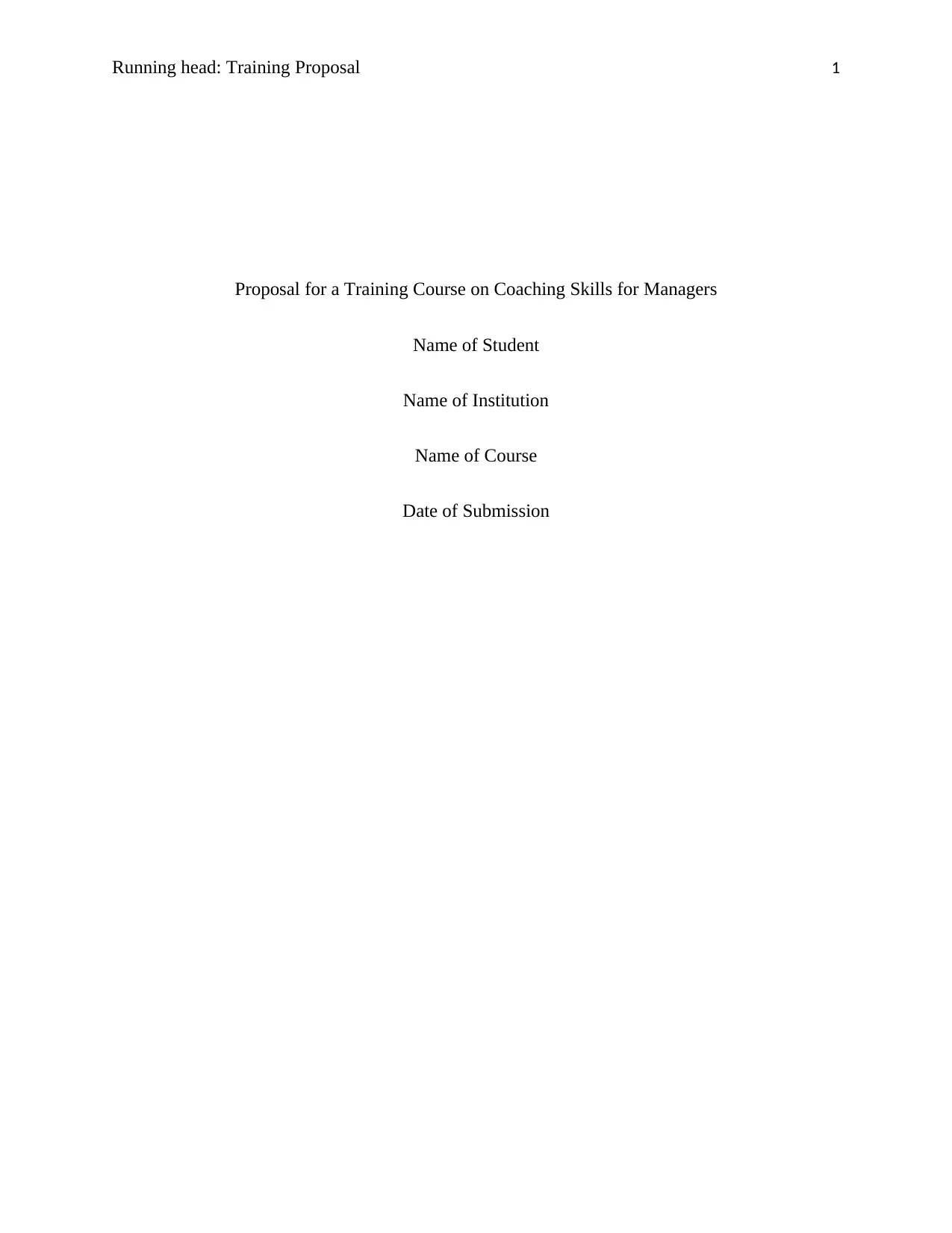
Running head: Training Proposal 1
Proposal for a Training Course on Coaching Skills for Managers
Name of Student
Name of Institution
Name of Course
Date of Submission
Proposal for a Training Course on Coaching Skills for Managers
Name of Student
Name of Institution
Name of Course
Date of Submission
Paraphrase This Document
Need a fresh take? Get an instant paraphrase of this document with our AI Paraphraser
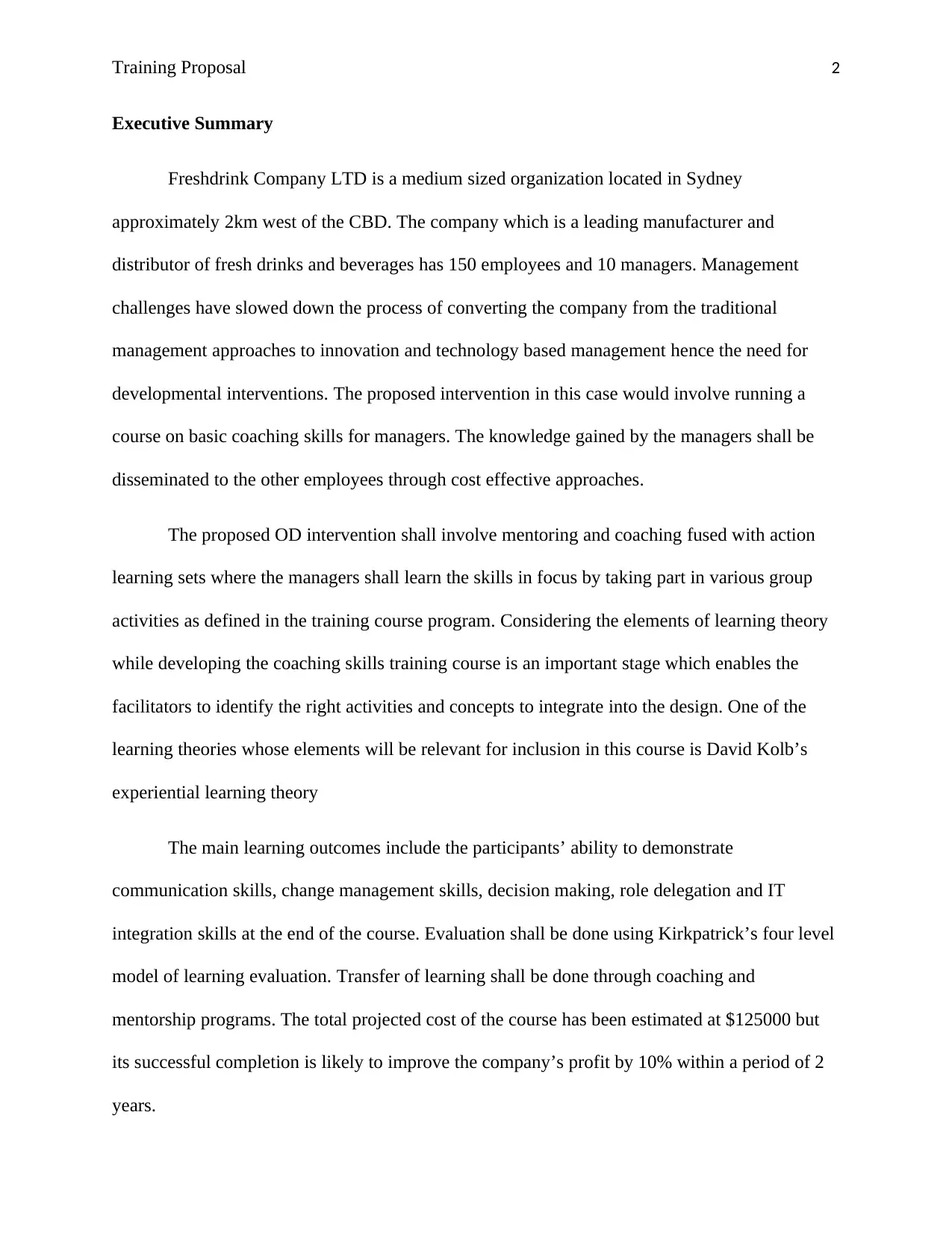
Training Proposal 2
Executive Summary
Freshdrink Company LTD is a medium sized organization located in Sydney
approximately 2km west of the CBD. The company which is a leading manufacturer and
distributor of fresh drinks and beverages has 150 employees and 10 managers. Management
challenges have slowed down the process of converting the company from the traditional
management approaches to innovation and technology based management hence the need for
developmental interventions. The proposed intervention in this case would involve running a
course on basic coaching skills for managers. The knowledge gained by the managers shall be
disseminated to the other employees through cost effective approaches.
The proposed OD intervention shall involve mentoring and coaching fused with action
learning sets where the managers shall learn the skills in focus by taking part in various group
activities as defined in the training course program. Considering the elements of learning theory
while developing the coaching skills training course is an important stage which enables the
facilitators to identify the right activities and concepts to integrate into the design. One of the
learning theories whose elements will be relevant for inclusion in this course is David Kolb’s
experiential learning theory
The main learning outcomes include the participants’ ability to demonstrate
communication skills, change management skills, decision making, role delegation and IT
integration skills at the end of the course. Evaluation shall be done using Kirkpatrick’s four level
model of learning evaluation. Transfer of learning shall be done through coaching and
mentorship programs. The total projected cost of the course has been estimated at $125000 but
its successful completion is likely to improve the company’s profit by 10% within a period of 2
years.
Executive Summary
Freshdrink Company LTD is a medium sized organization located in Sydney
approximately 2km west of the CBD. The company which is a leading manufacturer and
distributor of fresh drinks and beverages has 150 employees and 10 managers. Management
challenges have slowed down the process of converting the company from the traditional
management approaches to innovation and technology based management hence the need for
developmental interventions. The proposed intervention in this case would involve running a
course on basic coaching skills for managers. The knowledge gained by the managers shall be
disseminated to the other employees through cost effective approaches.
The proposed OD intervention shall involve mentoring and coaching fused with action
learning sets where the managers shall learn the skills in focus by taking part in various group
activities as defined in the training course program. Considering the elements of learning theory
while developing the coaching skills training course is an important stage which enables the
facilitators to identify the right activities and concepts to integrate into the design. One of the
learning theories whose elements will be relevant for inclusion in this course is David Kolb’s
experiential learning theory
The main learning outcomes include the participants’ ability to demonstrate
communication skills, change management skills, decision making, role delegation and IT
integration skills at the end of the course. Evaluation shall be done using Kirkpatrick’s four level
model of learning evaluation. Transfer of learning shall be done through coaching and
mentorship programs. The total projected cost of the course has been estimated at $125000 but
its successful completion is likely to improve the company’s profit by 10% within a period of 2
years.
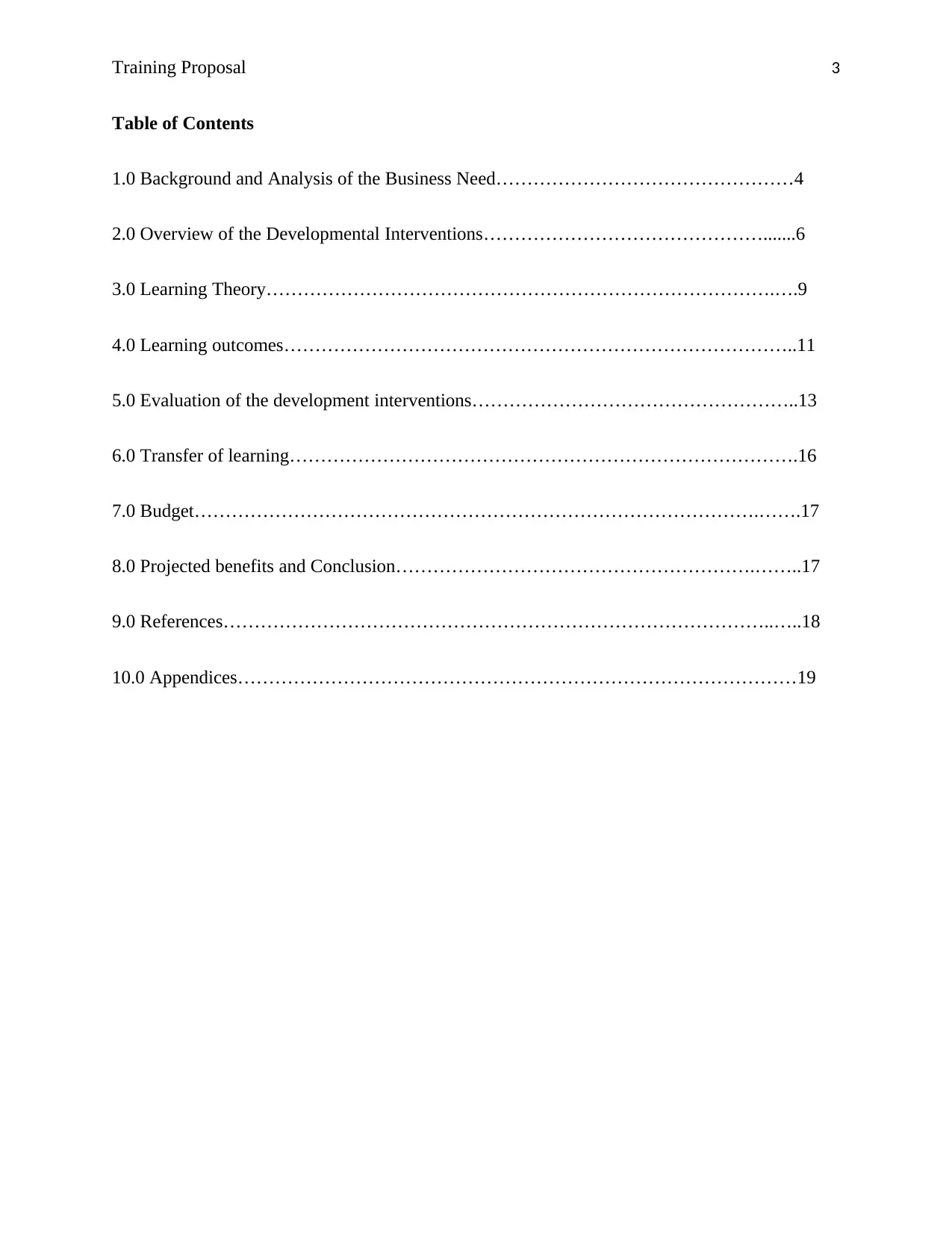
Training Proposal 3
Table of Contents
1.0 Background and Analysis of the Business Need…………………………………………4
2.0 Overview of the Developmental Interventions……………………………………….......6
3.0 Learning Theory……………………………………………………………………….….9
4.0 Learning outcomes………………………………………………………………………..11
5.0 Evaluation of the development interventions……………………………………………..13
6.0 Transfer of learning……………………………………………………………………….16
7.0 Budget……………………………………………………………………………….…….17
8.0 Projected benefits and Conclusion………………………………………………….……..17
9.0 References……………………………………………………………………………..…..18
10.0 Appendices………………………………………………………………………………19
Table of Contents
1.0 Background and Analysis of the Business Need…………………………………………4
2.0 Overview of the Developmental Interventions……………………………………….......6
3.0 Learning Theory……………………………………………………………………….….9
4.0 Learning outcomes………………………………………………………………………..11
5.0 Evaluation of the development interventions……………………………………………..13
6.0 Transfer of learning……………………………………………………………………….16
7.0 Budget……………………………………………………………………………….…….17
8.0 Projected benefits and Conclusion………………………………………………….……..17
9.0 References……………………………………………………………………………..…..18
10.0 Appendices………………………………………………………………………………19
⊘ This is a preview!⊘
Do you want full access?
Subscribe today to unlock all pages.

Trusted by 1+ million students worldwide
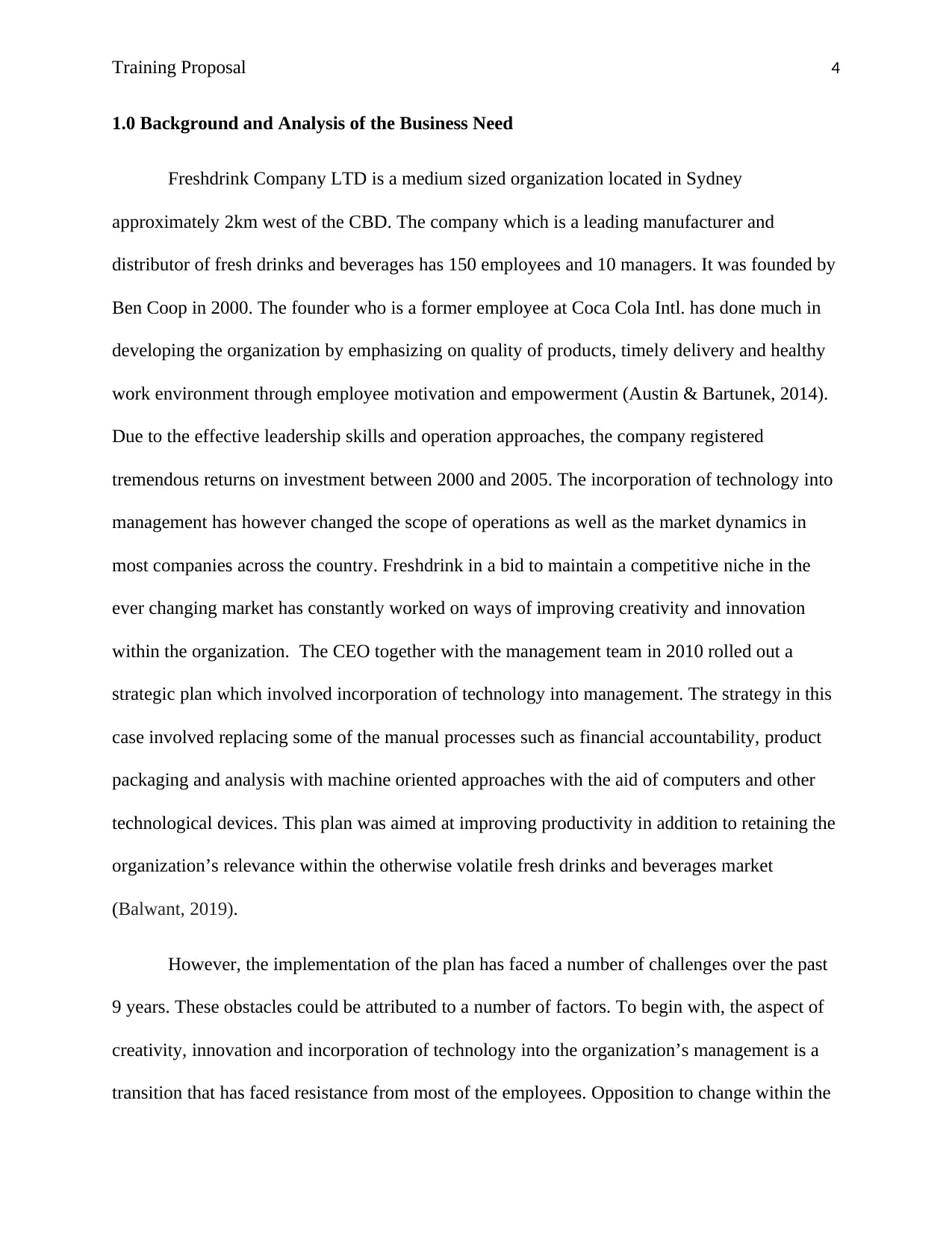
Training Proposal 4
1.0 Background and Analysis of the Business Need
Freshdrink Company LTD is a medium sized organization located in Sydney
approximately 2km west of the CBD. The company which is a leading manufacturer and
distributor of fresh drinks and beverages has 150 employees and 10 managers. It was founded by
Ben Coop in 2000. The founder who is a former employee at Coca Cola Intl. has done much in
developing the organization by emphasizing on quality of products, timely delivery and healthy
work environment through employee motivation and empowerment (Austin & Bartunek, 2014).
Due to the effective leadership skills and operation approaches, the company registered
tremendous returns on investment between 2000 and 2005. The incorporation of technology into
management has however changed the scope of operations as well as the market dynamics in
most companies across the country. Freshdrink in a bid to maintain a competitive niche in the
ever changing market has constantly worked on ways of improving creativity and innovation
within the organization. The CEO together with the management team in 2010 rolled out a
strategic plan which involved incorporation of technology into management. The strategy in this
case involved replacing some of the manual processes such as financial accountability, product
packaging and analysis with machine oriented approaches with the aid of computers and other
technological devices. This plan was aimed at improving productivity in addition to retaining the
organization’s relevance within the otherwise volatile fresh drinks and beverages market
(Balwant, 2019).
However, the implementation of the plan has faced a number of challenges over the past
9 years. These obstacles could be attributed to a number of factors. To begin with, the aspect of
creativity, innovation and incorporation of technology into the organization’s management is a
transition that has faced resistance from most of the employees. Opposition to change within the
1.0 Background and Analysis of the Business Need
Freshdrink Company LTD is a medium sized organization located in Sydney
approximately 2km west of the CBD. The company which is a leading manufacturer and
distributor of fresh drinks and beverages has 150 employees and 10 managers. It was founded by
Ben Coop in 2000. The founder who is a former employee at Coca Cola Intl. has done much in
developing the organization by emphasizing on quality of products, timely delivery and healthy
work environment through employee motivation and empowerment (Austin & Bartunek, 2014).
Due to the effective leadership skills and operation approaches, the company registered
tremendous returns on investment between 2000 and 2005. The incorporation of technology into
management has however changed the scope of operations as well as the market dynamics in
most companies across the country. Freshdrink in a bid to maintain a competitive niche in the
ever changing market has constantly worked on ways of improving creativity and innovation
within the organization. The CEO together with the management team in 2010 rolled out a
strategic plan which involved incorporation of technology into management. The strategy in this
case involved replacing some of the manual processes such as financial accountability, product
packaging and analysis with machine oriented approaches with the aid of computers and other
technological devices. This plan was aimed at improving productivity in addition to retaining the
organization’s relevance within the otherwise volatile fresh drinks and beverages market
(Balwant, 2019).
However, the implementation of the plan has faced a number of challenges over the past
9 years. These obstacles could be attributed to a number of factors. To begin with, the aspect of
creativity, innovation and incorporation of technology into the organization’s management is a
transition that has faced resistance from most of the employees. Opposition to change within the
Paraphrase This Document
Need a fresh take? Get an instant paraphrase of this document with our AI Paraphraser
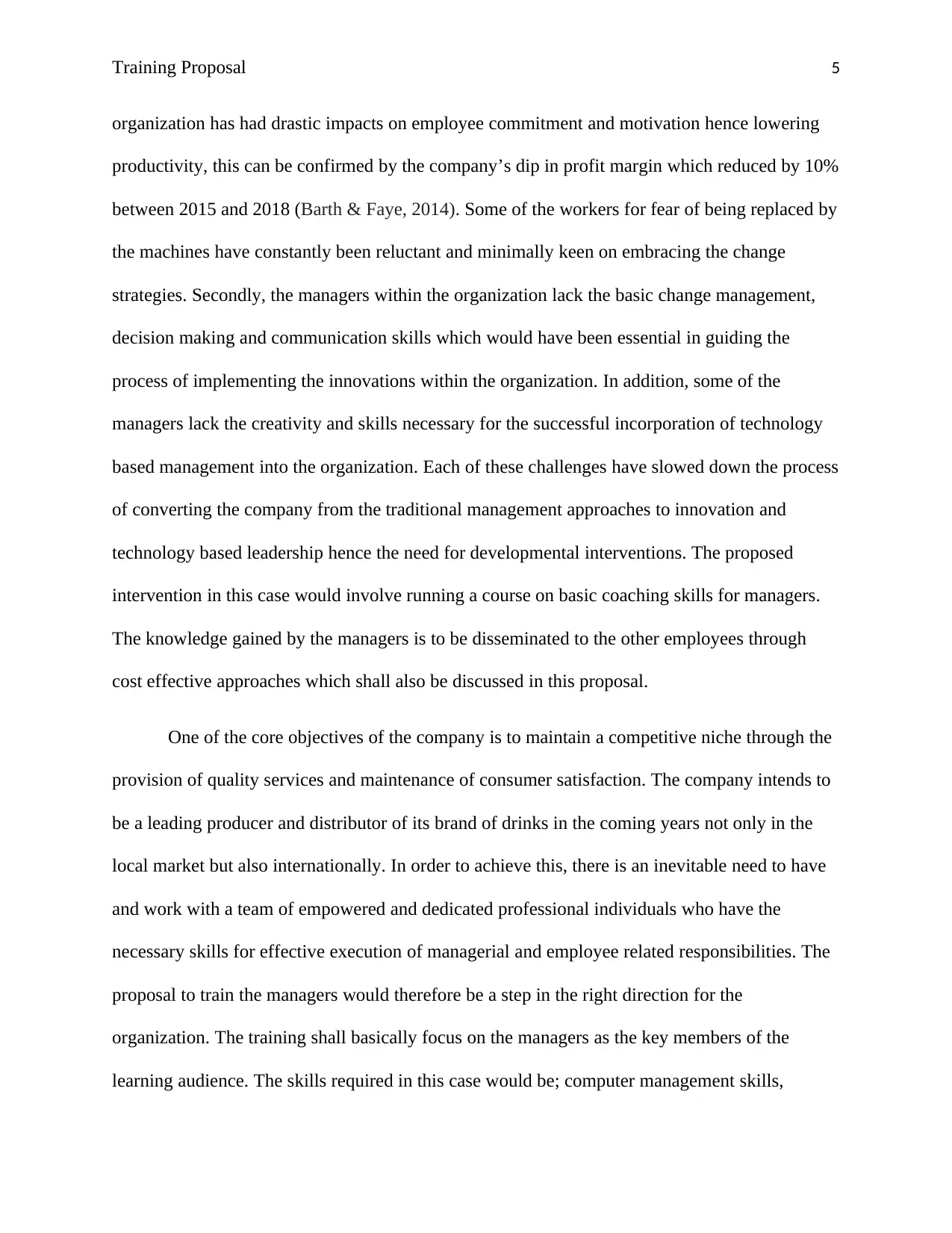
Training Proposal 5
organization has had drastic impacts on employee commitment and motivation hence lowering
productivity, this can be confirmed by the company’s dip in profit margin which reduced by 10%
between 2015 and 2018 (Barth & Faye, 2014). Some of the workers for fear of being replaced by
the machines have constantly been reluctant and minimally keen on embracing the change
strategies. Secondly, the managers within the organization lack the basic change management,
decision making and communication skills which would have been essential in guiding the
process of implementing the innovations within the organization. In addition, some of the
managers lack the creativity and skills necessary for the successful incorporation of technology
based management into the organization. Each of these challenges have slowed down the process
of converting the company from the traditional management approaches to innovation and
technology based leadership hence the need for developmental interventions. The proposed
intervention in this case would involve running a course on basic coaching skills for managers.
The knowledge gained by the managers is to be disseminated to the other employees through
cost effective approaches which shall also be discussed in this proposal.
One of the core objectives of the company is to maintain a competitive niche through the
provision of quality services and maintenance of consumer satisfaction. The company intends to
be a leading producer and distributor of its brand of drinks in the coming years not only in the
local market but also internationally. In order to achieve this, there is an inevitable need to have
and work with a team of empowered and dedicated professional individuals who have the
necessary skills for effective execution of managerial and employee related responsibilities. The
proposal to train the managers would therefore be a step in the right direction for the
organization. The training shall basically focus on the managers as the key members of the
learning audience. The skills required in this case would be; computer management skills,
organization has had drastic impacts on employee commitment and motivation hence lowering
productivity, this can be confirmed by the company’s dip in profit margin which reduced by 10%
between 2015 and 2018 (Barth & Faye, 2014). Some of the workers for fear of being replaced by
the machines have constantly been reluctant and minimally keen on embracing the change
strategies. Secondly, the managers within the organization lack the basic change management,
decision making and communication skills which would have been essential in guiding the
process of implementing the innovations within the organization. In addition, some of the
managers lack the creativity and skills necessary for the successful incorporation of technology
based management into the organization. Each of these challenges have slowed down the process
of converting the company from the traditional management approaches to innovation and
technology based leadership hence the need for developmental interventions. The proposed
intervention in this case would involve running a course on basic coaching skills for managers.
The knowledge gained by the managers is to be disseminated to the other employees through
cost effective approaches which shall also be discussed in this proposal.
One of the core objectives of the company is to maintain a competitive niche through the
provision of quality services and maintenance of consumer satisfaction. The company intends to
be a leading producer and distributor of its brand of drinks in the coming years not only in the
local market but also internationally. In order to achieve this, there is an inevitable need to have
and work with a team of empowered and dedicated professional individuals who have the
necessary skills for effective execution of managerial and employee related responsibilities. The
proposal to train the managers would therefore be a step in the right direction for the
organization. The training shall basically focus on the managers as the key members of the
learning audience. The skills required in this case would be; computer management skills,
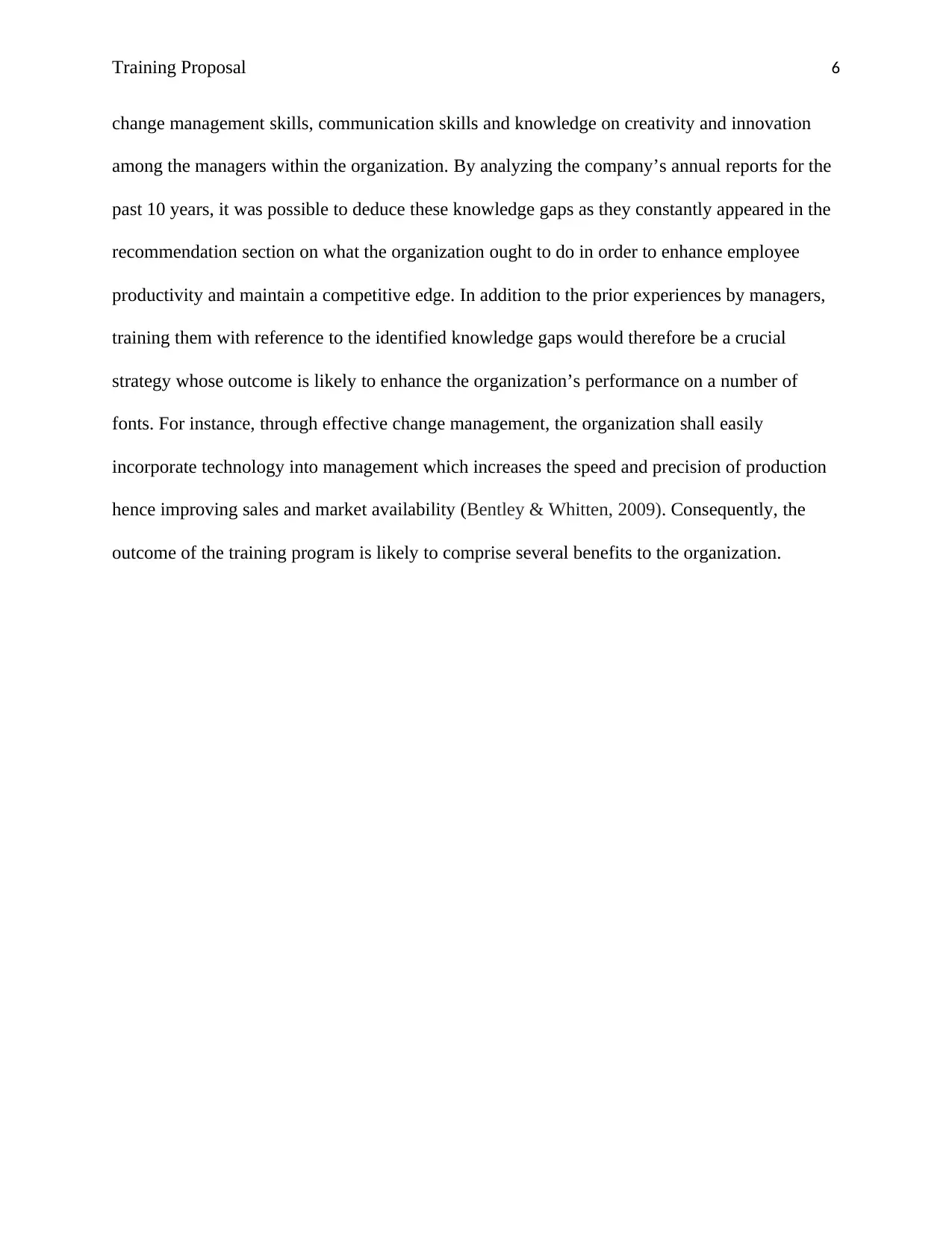
Training Proposal 6
change management skills, communication skills and knowledge on creativity and innovation
among the managers within the organization. By analyzing the company’s annual reports for the
past 10 years, it was possible to deduce these knowledge gaps as they constantly appeared in the
recommendation section on what the organization ought to do in order to enhance employee
productivity and maintain a competitive edge. In addition to the prior experiences by managers,
training them with reference to the identified knowledge gaps would therefore be a crucial
strategy whose outcome is likely to enhance the organization’s performance on a number of
fonts. For instance, through effective change management, the organization shall easily
incorporate technology into management which increases the speed and precision of production
hence improving sales and market availability (Bentley & Whitten, 2009). Consequently, the
outcome of the training program is likely to comprise several benefits to the organization.
change management skills, communication skills and knowledge on creativity and innovation
among the managers within the organization. By analyzing the company’s annual reports for the
past 10 years, it was possible to deduce these knowledge gaps as they constantly appeared in the
recommendation section on what the organization ought to do in order to enhance employee
productivity and maintain a competitive edge. In addition to the prior experiences by managers,
training them with reference to the identified knowledge gaps would therefore be a crucial
strategy whose outcome is likely to enhance the organization’s performance on a number of
fonts. For instance, through effective change management, the organization shall easily
incorporate technology into management which increases the speed and precision of production
hence improving sales and market availability (Bentley & Whitten, 2009). Consequently, the
outcome of the training program is likely to comprise several benefits to the organization.
⊘ This is a preview!⊘
Do you want full access?
Subscribe today to unlock all pages.

Trusted by 1+ million students worldwide
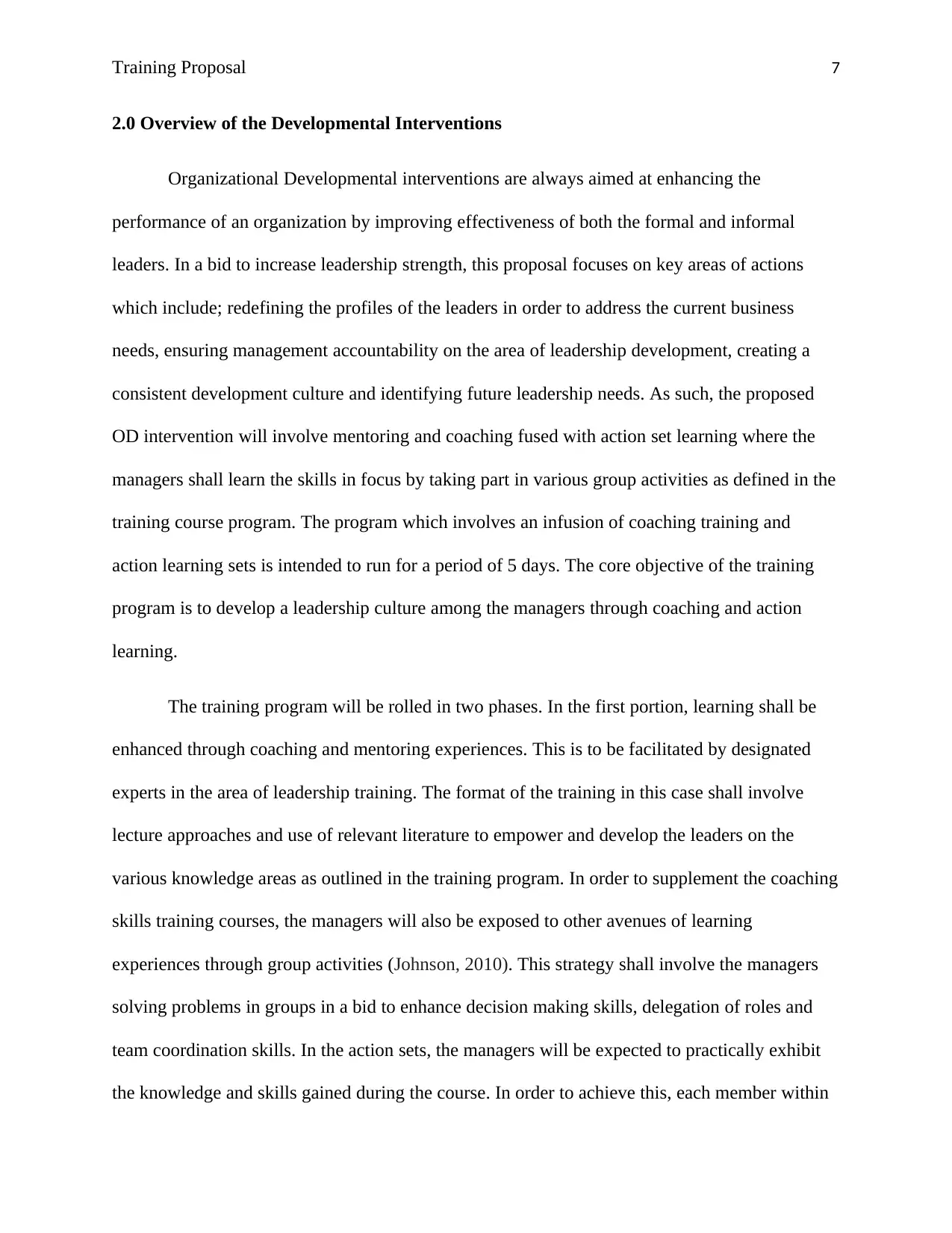
Training Proposal 7
2.0 Overview of the Developmental Interventions
Organizational Developmental interventions are always aimed at enhancing the
performance of an organization by improving effectiveness of both the formal and informal
leaders. In a bid to increase leadership strength, this proposal focuses on key areas of actions
which include; redefining the profiles of the leaders in order to address the current business
needs, ensuring management accountability on the area of leadership development, creating a
consistent development culture and identifying future leadership needs. As such, the proposed
OD intervention will involve mentoring and coaching fused with action set learning where the
managers shall learn the skills in focus by taking part in various group activities as defined in the
training course program. The program which involves an infusion of coaching training and
action learning sets is intended to run for a period of 5 days. The core objective of the training
program is to develop a leadership culture among the managers through coaching and action
learning.
The training program will be rolled in two phases. In the first portion, learning shall be
enhanced through coaching and mentoring experiences. This is to be facilitated by designated
experts in the area of leadership training. The format of the training in this case shall involve
lecture approaches and use of relevant literature to empower and develop the leaders on the
various knowledge areas as outlined in the training program. In order to supplement the coaching
skills training courses, the managers will also be exposed to other avenues of learning
experiences through group activities (Johnson, 2010). This strategy shall involve the managers
solving problems in groups in a bid to enhance decision making skills, delegation of roles and
team coordination skills. In the action sets, the managers will be expected to practically exhibit
the knowledge and skills gained during the course. In order to achieve this, each member within
2.0 Overview of the Developmental Interventions
Organizational Developmental interventions are always aimed at enhancing the
performance of an organization by improving effectiveness of both the formal and informal
leaders. In a bid to increase leadership strength, this proposal focuses on key areas of actions
which include; redefining the profiles of the leaders in order to address the current business
needs, ensuring management accountability on the area of leadership development, creating a
consistent development culture and identifying future leadership needs. As such, the proposed
OD intervention will involve mentoring and coaching fused with action set learning where the
managers shall learn the skills in focus by taking part in various group activities as defined in the
training course program. The program which involves an infusion of coaching training and
action learning sets is intended to run for a period of 5 days. The core objective of the training
program is to develop a leadership culture among the managers through coaching and action
learning.
The training program will be rolled in two phases. In the first portion, learning shall be
enhanced through coaching and mentoring experiences. This is to be facilitated by designated
experts in the area of leadership training. The format of the training in this case shall involve
lecture approaches and use of relevant literature to empower and develop the leaders on the
various knowledge areas as outlined in the training program. In order to supplement the coaching
skills training courses, the managers will also be exposed to other avenues of learning
experiences through group activities (Johnson, 2010). This strategy shall involve the managers
solving problems in groups in a bid to enhance decision making skills, delegation of roles and
team coordination skills. In the action sets, the managers will be expected to practically exhibit
the knowledge and skills gained during the course. In order to achieve this, each member within
Paraphrase This Document
Need a fresh take? Get an instant paraphrase of this document with our AI Paraphraser
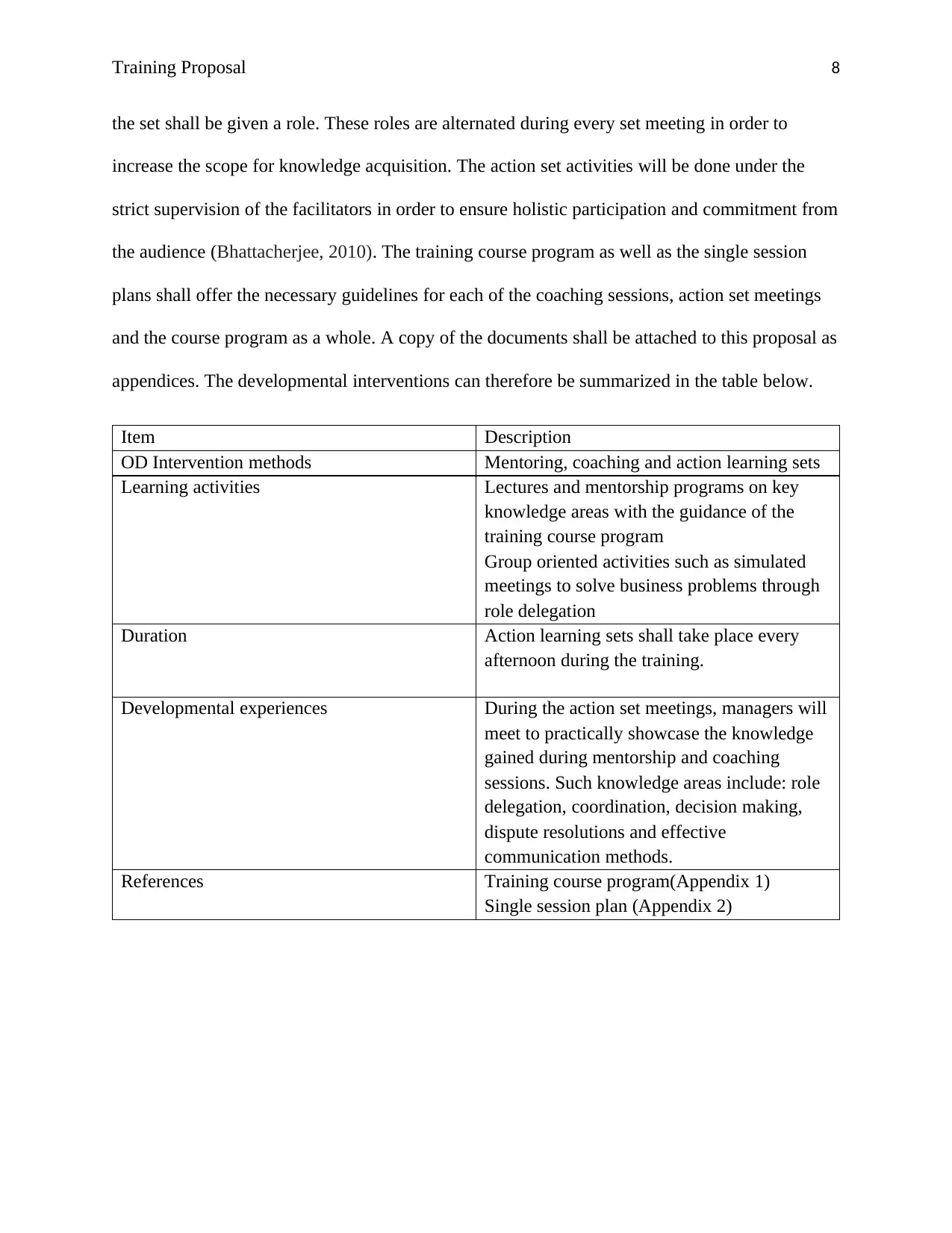
Training Proposal 8
the set shall be given a role. These roles are alternated during every set meeting in order to
increase the scope for knowledge acquisition. The action set activities will be done under the
strict supervision of the facilitators in order to ensure holistic participation and commitment from
the audience (Bhattacherjee, 2010). The training course program as well as the single session
plans shall offer the necessary guidelines for each of the coaching sessions, action set meetings
and the course program as a whole. A copy of the documents shall be attached to this proposal as
appendices. The developmental interventions can therefore be summarized in the table below.
Item Description
OD Intervention methods Mentoring, coaching and action learning sets
Learning activities Lectures and mentorship programs on key
knowledge areas with the guidance of the
training course program
Group oriented activities such as simulated
meetings to solve business problems through
role delegation
Duration Action learning sets shall take place every
afternoon during the training.
Developmental experiences During the action set meetings, managers will
meet to practically showcase the knowledge
gained during mentorship and coaching
sessions. Such knowledge areas include: role
delegation, coordination, decision making,
dispute resolutions and effective
communication methods.
References Training course program(Appendix 1)
Single session plan (Appendix 2)
the set shall be given a role. These roles are alternated during every set meeting in order to
increase the scope for knowledge acquisition. The action set activities will be done under the
strict supervision of the facilitators in order to ensure holistic participation and commitment from
the audience (Bhattacherjee, 2010). The training course program as well as the single session
plans shall offer the necessary guidelines for each of the coaching sessions, action set meetings
and the course program as a whole. A copy of the documents shall be attached to this proposal as
appendices. The developmental interventions can therefore be summarized in the table below.
Item Description
OD Intervention methods Mentoring, coaching and action learning sets
Learning activities Lectures and mentorship programs on key
knowledge areas with the guidance of the
training course program
Group oriented activities such as simulated
meetings to solve business problems through
role delegation
Duration Action learning sets shall take place every
afternoon during the training.
Developmental experiences During the action set meetings, managers will
meet to practically showcase the knowledge
gained during mentorship and coaching
sessions. Such knowledge areas include: role
delegation, coordination, decision making,
dispute resolutions and effective
communication methods.
References Training course program(Appendix 1)
Single session plan (Appendix 2)
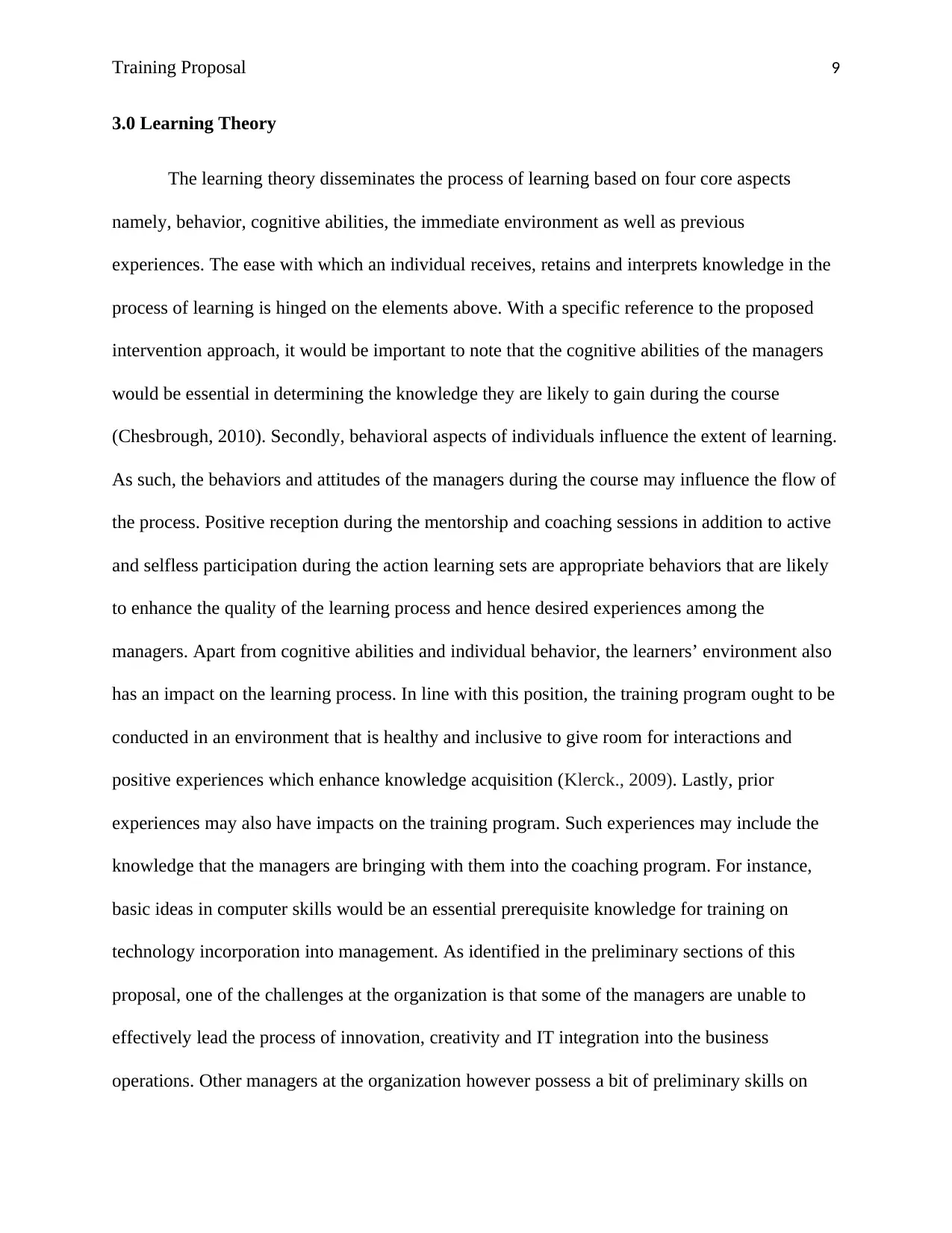
Training Proposal 9
3.0 Learning Theory
The learning theory disseminates the process of learning based on four core aspects
namely, behavior, cognitive abilities, the immediate environment as well as previous
experiences. The ease with which an individual receives, retains and interprets knowledge in the
process of learning is hinged on the elements above. With a specific reference to the proposed
intervention approach, it would be important to note that the cognitive abilities of the managers
would be essential in determining the knowledge they are likely to gain during the course
(Chesbrough, 2010). Secondly, behavioral aspects of individuals influence the extent of learning.
As such, the behaviors and attitudes of the managers during the course may influence the flow of
the process. Positive reception during the mentorship and coaching sessions in addition to active
and selfless participation during the action learning sets are appropriate behaviors that are likely
to enhance the quality of the learning process and hence desired experiences among the
managers. Apart from cognitive abilities and individual behavior, the learners’ environment also
has an impact on the learning process. In line with this position, the training program ought to be
conducted in an environment that is healthy and inclusive to give room for interactions and
positive experiences which enhance knowledge acquisition (Klerck., 2009). Lastly, prior
experiences may also have impacts on the training program. Such experiences may include the
knowledge that the managers are bringing with them into the coaching program. For instance,
basic ideas in computer skills would be an essential prerequisite knowledge for training on
technology incorporation into management. As identified in the preliminary sections of this
proposal, one of the challenges at the organization is that some of the managers are unable to
effectively lead the process of innovation, creativity and IT integration into the business
operations. Other managers at the organization however possess a bit of preliminary skills on
3.0 Learning Theory
The learning theory disseminates the process of learning based on four core aspects
namely, behavior, cognitive abilities, the immediate environment as well as previous
experiences. The ease with which an individual receives, retains and interprets knowledge in the
process of learning is hinged on the elements above. With a specific reference to the proposed
intervention approach, it would be important to note that the cognitive abilities of the managers
would be essential in determining the knowledge they are likely to gain during the course
(Chesbrough, 2010). Secondly, behavioral aspects of individuals influence the extent of learning.
As such, the behaviors and attitudes of the managers during the course may influence the flow of
the process. Positive reception during the mentorship and coaching sessions in addition to active
and selfless participation during the action learning sets are appropriate behaviors that are likely
to enhance the quality of the learning process and hence desired experiences among the
managers. Apart from cognitive abilities and individual behavior, the learners’ environment also
has an impact on the learning process. In line with this position, the training program ought to be
conducted in an environment that is healthy and inclusive to give room for interactions and
positive experiences which enhance knowledge acquisition (Klerck., 2009). Lastly, prior
experiences may also have impacts on the training program. Such experiences may include the
knowledge that the managers are bringing with them into the coaching program. For instance,
basic ideas in computer skills would be an essential prerequisite knowledge for training on
technology incorporation into management. As identified in the preliminary sections of this
proposal, one of the challenges at the organization is that some of the managers are unable to
effectively lead the process of innovation, creativity and IT integration into the business
operations. Other managers at the organization however possess a bit of preliminary skills on
⊘ This is a preview!⊘
Do you want full access?
Subscribe today to unlock all pages.

Trusted by 1+ million students worldwide
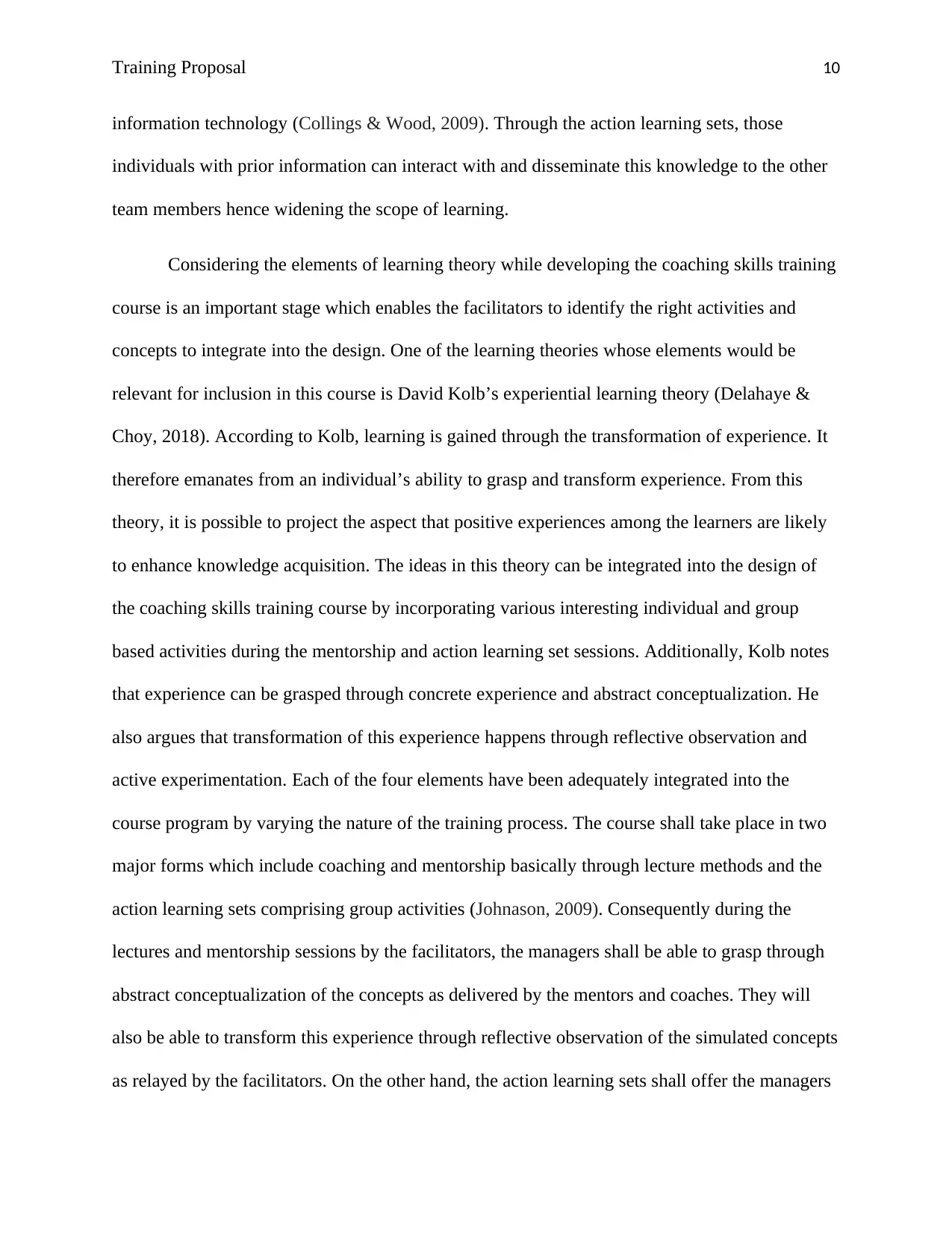
Training Proposal 10
information technology (Collings & Wood, 2009). Through the action learning sets, those
individuals with prior information can interact with and disseminate this knowledge to the other
team members hence widening the scope of learning.
Considering the elements of learning theory while developing the coaching skills training
course is an important stage which enables the facilitators to identify the right activities and
concepts to integrate into the design. One of the learning theories whose elements would be
relevant for inclusion in this course is David Kolb’s experiential learning theory (Delahaye &
Choy, 2018). According to Kolb, learning is gained through the transformation of experience. It
therefore emanates from an individual’s ability to grasp and transform experience. From this
theory, it is possible to project the aspect that positive experiences among the learners are likely
to enhance knowledge acquisition. The ideas in this theory can be integrated into the design of
the coaching skills training course by incorporating various interesting individual and group
based activities during the mentorship and action learning set sessions. Additionally, Kolb notes
that experience can be grasped through concrete experience and abstract conceptualization. He
also argues that transformation of this experience happens through reflective observation and
active experimentation. Each of the four elements have been adequately integrated into the
course program by varying the nature of the training process. The course shall take place in two
major forms which include coaching and mentorship basically through lecture methods and the
action learning sets comprising group activities (Johnason, 2009). Consequently during the
lectures and mentorship sessions by the facilitators, the managers shall be able to grasp through
abstract conceptualization of the concepts as delivered by the mentors and coaches. They will
also be able to transform this experience through reflective observation of the simulated concepts
as relayed by the facilitators. On the other hand, the action learning sets shall offer the managers
information technology (Collings & Wood, 2009). Through the action learning sets, those
individuals with prior information can interact with and disseminate this knowledge to the other
team members hence widening the scope of learning.
Considering the elements of learning theory while developing the coaching skills training
course is an important stage which enables the facilitators to identify the right activities and
concepts to integrate into the design. One of the learning theories whose elements would be
relevant for inclusion in this course is David Kolb’s experiential learning theory (Delahaye &
Choy, 2018). According to Kolb, learning is gained through the transformation of experience. It
therefore emanates from an individual’s ability to grasp and transform experience. From this
theory, it is possible to project the aspect that positive experiences among the learners are likely
to enhance knowledge acquisition. The ideas in this theory can be integrated into the design of
the coaching skills training course by incorporating various interesting individual and group
based activities during the mentorship and action learning set sessions. Additionally, Kolb notes
that experience can be grasped through concrete experience and abstract conceptualization. He
also argues that transformation of this experience happens through reflective observation and
active experimentation. Each of the four elements have been adequately integrated into the
course program by varying the nature of the training process. The course shall take place in two
major forms which include coaching and mentorship basically through lecture methods and the
action learning sets comprising group activities (Johnason, 2009). Consequently during the
lectures and mentorship sessions by the facilitators, the managers shall be able to grasp through
abstract conceptualization of the concepts as delivered by the mentors and coaches. They will
also be able to transform this experience through reflective observation of the simulated concepts
as relayed by the facilitators. On the other hand, the action learning sets shall offer the managers
Paraphrase This Document
Need a fresh take? Get an instant paraphrase of this document with our AI Paraphraser
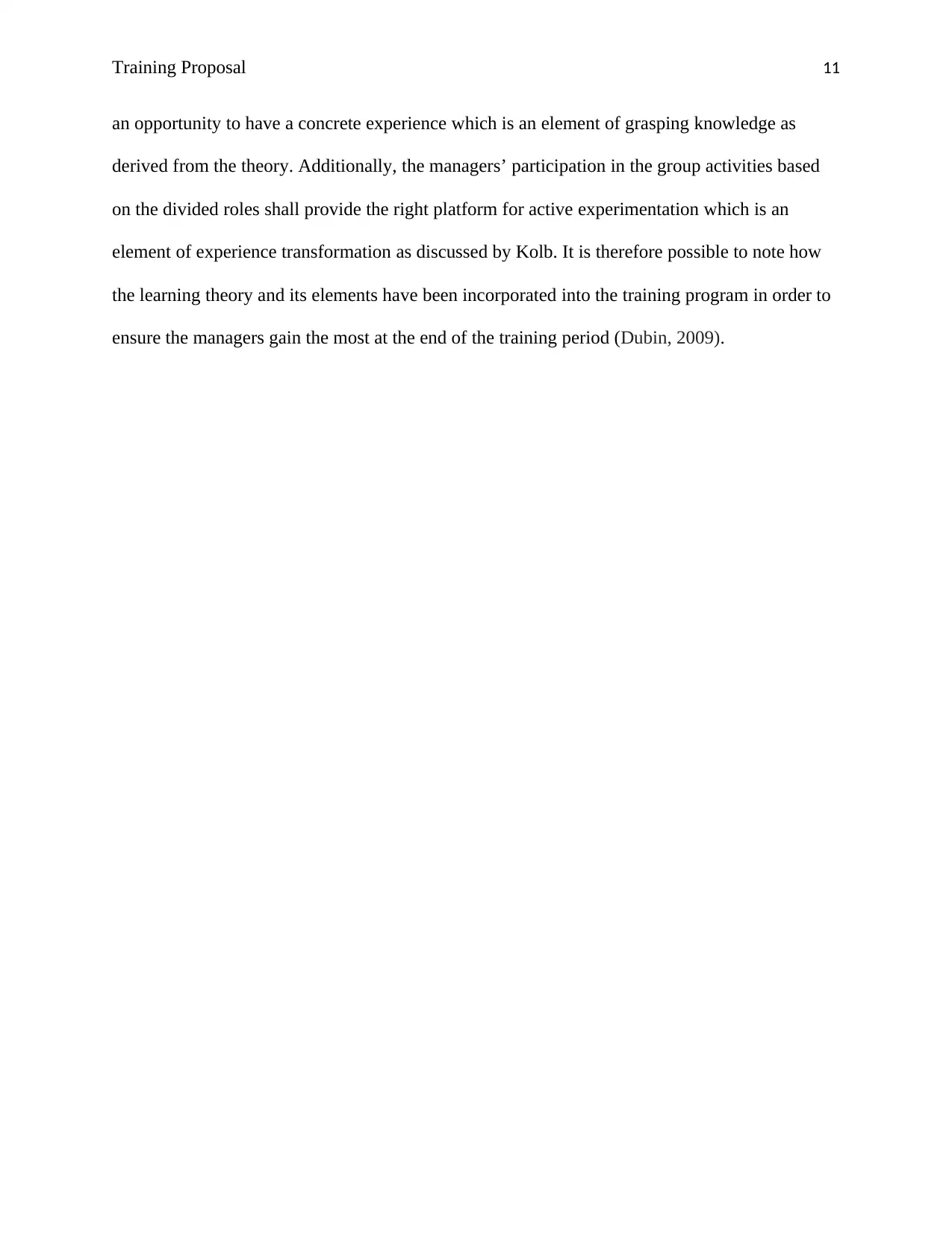
Training Proposal 11
an opportunity to have a concrete experience which is an element of grasping knowledge as
derived from the theory. Additionally, the managers’ participation in the group activities based
on the divided roles shall provide the right platform for active experimentation which is an
element of experience transformation as discussed by Kolb. It is therefore possible to note how
the learning theory and its elements have been incorporated into the training program in order to
ensure the managers gain the most at the end of the training period (Dubin, 2009).
an opportunity to have a concrete experience which is an element of grasping knowledge as
derived from the theory. Additionally, the managers’ participation in the group activities based
on the divided roles shall provide the right platform for active experimentation which is an
element of experience transformation as discussed by Kolb. It is therefore possible to note how
the learning theory and its elements have been incorporated into the training program in order to
ensure the managers gain the most at the end of the training period (Dubin, 2009).
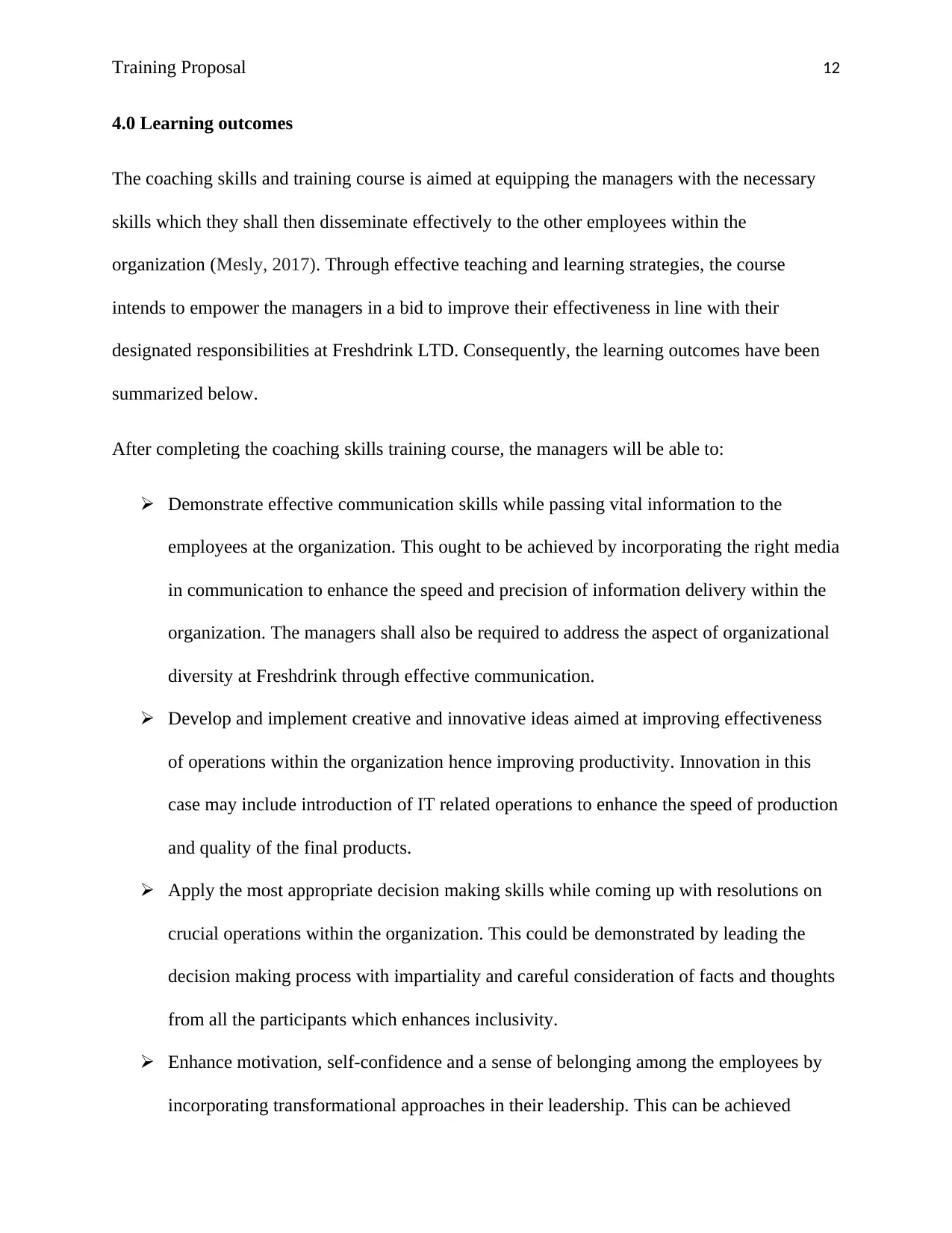
Training Proposal 12
4.0 Learning outcomes
The coaching skills and training course is aimed at equipping the managers with the necessary
skills which they shall then disseminate effectively to the other employees within the
organization (Mesly, 2017). Through effective teaching and learning strategies, the course
intends to empower the managers in a bid to improve their effectiveness in line with their
designated responsibilities at Freshdrink LTD. Consequently, the learning outcomes have been
summarized below.
After completing the coaching skills training course, the managers will be able to:
Demonstrate effective communication skills while passing vital information to the
employees at the organization. This ought to be achieved by incorporating the right media
in communication to enhance the speed and precision of information delivery within the
organization. The managers shall also be required to address the aspect of organizational
diversity at Freshdrink through effective communication.
Develop and implement creative and innovative ideas aimed at improving effectiveness
of operations within the organization hence improving productivity. Innovation in this
case may include introduction of IT related operations to enhance the speed of production
and quality of the final products.
Apply the most appropriate decision making skills while coming up with resolutions on
crucial operations within the organization. This could be demonstrated by leading the
decision making process with impartiality and careful consideration of facts and thoughts
from all the participants which enhances inclusivity.
Enhance motivation, self-confidence and a sense of belonging among the employees by
incorporating transformational approaches in their leadership. This can be achieved
4.0 Learning outcomes
The coaching skills and training course is aimed at equipping the managers with the necessary
skills which they shall then disseminate effectively to the other employees within the
organization (Mesly, 2017). Through effective teaching and learning strategies, the course
intends to empower the managers in a bid to improve their effectiveness in line with their
designated responsibilities at Freshdrink LTD. Consequently, the learning outcomes have been
summarized below.
After completing the coaching skills training course, the managers will be able to:
Demonstrate effective communication skills while passing vital information to the
employees at the organization. This ought to be achieved by incorporating the right media
in communication to enhance the speed and precision of information delivery within the
organization. The managers shall also be required to address the aspect of organizational
diversity at Freshdrink through effective communication.
Develop and implement creative and innovative ideas aimed at improving effectiveness
of operations within the organization hence improving productivity. Innovation in this
case may include introduction of IT related operations to enhance the speed of production
and quality of the final products.
Apply the most appropriate decision making skills while coming up with resolutions on
crucial operations within the organization. This could be demonstrated by leading the
decision making process with impartiality and careful consideration of facts and thoughts
from all the participants which enhances inclusivity.
Enhance motivation, self-confidence and a sense of belonging among the employees by
incorporating transformational approaches in their leadership. This can be achieved
⊘ This is a preview!⊘
Do you want full access?
Subscribe today to unlock all pages.

Trusted by 1+ million students worldwide
1 out of 25
Your All-in-One AI-Powered Toolkit for Academic Success.
+13062052269
info@desklib.com
Available 24*7 on WhatsApp / Email
![[object Object]](/_next/static/media/star-bottom.7253800d.svg)
Unlock your academic potential
Copyright © 2020–2026 A2Z Services. All Rights Reserved. Developed and managed by ZUCOL.
